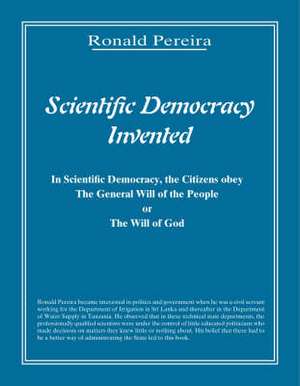Scientific Democracy Invented
Autor Ronald Pereiraen Limba Engleză Paperback
The title "Scientific Democracy Invented" needs an explanation. Since the 16th century, Mathematicians and Sociologists have anticipated a time when politicians would solve human problems the way Scientists solve theirs, rather than through fraud, corruption, violence and warfare.
There is an analogy between the Human Body and Scientific Democracy
Scientific Democracy has an analogy with the working of the Human Body. This is shown in Part 15, Sections A, B, and C. Biological theory led to the Organic Theory of the State. Both Plato and Aristotle argued that the State was an organism. They argued that the cell is to the human body as the individual is to the State. Therefore the rights of the State precede the rights of individuals. Others who believed in this theory were the philosophers Claude Saint Simon, Herbert Spencer, and the Communists.
Sociologists have anticipated a time when politics would become a Science, and Laws would be indisputable principles, not the Whims of elected Rulers.
Please refer to Parts 1, Sections A, B and C and Part 15, Section A.
In the 16th Century, Francis Bacon published his book in which he gives a vivid picture of mankind guided by the Sciences. Later, Rene Descartes tried to work out a scientific system of society but failed. In 1813, the French sociologist Claude Saint Simon published his book in which he expressed the idea that politics would become a positive science and that political problems would be solved in the way scientists solve theirs. In the nineteenth Century, Herbert Spencer expressed the belief that Politics was moving from a system based on irrationaldesires and ambitions to an era when the application of science will be in the direction of justice on earth.
In the 19th Century, Auguste Comte published his book outlining his philosophy of history in terms of the three stages of thought. He argued that, "the great political crises that societies are undergoing was caused by intellectual anarchy. He says, until a certain number of general ideas can be acknowledged as a rallying point of social doctrine, all nations will remain in a revolutionary state whatever palliatives may be devised. But whenever the necessary agreement on first principles can be obtained, appropriate institutions will issue from them without shock or resistance for the cause of the disorder will have been arrested by the mere fact of the agreement."
CONCERNING THE SUB-TITLE: The Citizens obey the General Will of the People or The Will of God
Prior to the French Revolution, Kings were considered to be the owners of the State and the Will of the King, their landlord, was law to the Citizens. The Law was such that the People lived in dire poverty and misery. The French philosopher, Jean Jacques Rousseau, argued in his book "Social Contract" that the State belonged to the People, not the King, and that King was only an agent of the People. Thus, the Citizens must obey the General Will of the People, not the Will of the King.
The problem till this book was published was that Philosophers have not been able to devise a political system that establishes the General Will of the People, and the Citizens, all over the world, are forced to obey the Will of the Leader of the Majority Party that is victorious in the elections. Thus in Modern Democracies, thegovernment is not a government of the People, it is a government of a Party (in the Party system) or a government by a Dictator (in the Presidential system). The consequences are fraud, corruption, poverty for the majority, and revolutions, and civil wars.
In "Scientific Democracy Invented," every citizen can participate in problem-solving, law-making or decision-making. Thus, the government is a government of the people, by the people, for the people. Every Citizen has the right to dispute the laws and decisions made by those in authority. Thus, the Will of those in authority becomes the General Will of the People. Please refer to Part 13, Sections A to E.
There is another big dispute in Human Society, it is over the Will of God. In ancient times, the Sages created an entity known as "God" in order to induct the laws and principles that all people should obey. Some of these Sages were not concerned with "God's" existence and characteristics, all they were concerned with was how "God" made his Will known to man and what "God" had to say. . The other category of Sages were believers in the existence of "Gods" and that there was a real "God."
Those Sages who believed that" God" was real and that He existed, believed that it was He who created this world, He was a Supreme Being who loved some people and disliked others, He was a male but He did not like females. He loved to be worshipped, and bestowed gifts on those who had Faith in Him and prayed to Him.
The term "God" in ancient Religious theory was to the ancient Sages just an entity similar to the symbol "X" in modern Mathematics and Science. Mathematicians and Scientists use the symbol "X" to derive the Laws andPrinciples from their theories about the world. They are not concerned with the characteristics of "X" which is only a means to an end.
Modern Religious leaders, on the other hand, venerate "God" as the Creator of this world, and preach that he is a Supernatural Being who can solve people's problems if the people would only believe in their theories. According to their theories, God created this world, they were God's representatives on earth, sex was evil, women were evil, God loves the rich people and those who contribute to the upkeep of the Churches.
The author argues that, if God created the world, then those Laws established by Scientists are the Will of God. But it does not matter whether "God" really exists because the Scientists have proved that the Laws they derived are indisputable. Therefore, the assumptions the scientists made were correc
| Toate formatele și edițiile | Preț | Express |
|---|---|---|
| Paperback (1) | 200.70 lei 6-8 săpt. | |
| Troubador Publishing – | 200.70 lei 6-8 săpt. | |
| Hardback (1) | 281.90 lei 6-8 săpt. | |
| Troubador Publishing – | 281.90 lei 6-8 săpt. |
Preț: 200.70 lei
Nou
Puncte Express: 301
Preț estimativ în valută:
38.40€ • 40.20$ • 31.78£
38.40€ • 40.20$ • 31.78£
Carte tipărită la comandă
Livrare economică 08-22 aprilie
Preluare comenzi: 021 569.72.76
Specificații
ISBN-13: 9781412023139
ISBN-10: 1412023130
Pagini: 428
Dimensiuni: 178 x 254 x 22 mm
Greutate: 0.74 kg
Editura: Troubador Publishing
ISBN-10: 1412023130
Pagini: 428
Dimensiuni: 178 x 254 x 22 mm
Greutate: 0.74 kg
Editura: Troubador Publishing
Notă biografică
Ronald Pereira became interested in politics and government when he was a civil servant working for the department of Irrigation in Sri Lanka and thereafter in the Department of Water Supply in Tanzania. He observed that in these technical state departments, the professionally qualified scientists were under the control of little educated politicians who made decisions on matters they knew little or nothing about. His belief that there had to be a better way of administrating the State led to this book.





